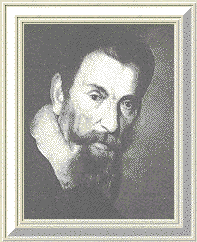 His
importance to the development of music cannot easily be overestimated.
With Beethoven, Wagner
and Debussy he belongs to those composers of
tremendously
revolutionizing influence whose creative achievements altered the
musical climate of their respective periods. Growing up during the
transition
from the Renaissance to the Baroque age, he alone was capable of
leading music successfully from the obsolescent polyphonic tradition of
the late Renaissance, through the primitive declamatory experiments of
the Florentines, to the fertile
new forms of opera,
cantata
and orchestrally inspired church music. He is heir to the august
assembly of Renaissance
madrigalists, yet he
discards the polyphonic
madrigal
after 1614 and excels in his later years in the new art of thorough-bass
practice. His opera "Orfeo", while eclipsing Peri's and Caccini's
earlier efforts by its sheer musicality, is still in many respects a product
of Grecian humanism. His last, "Poppea", on the other hand, uses
for the first time an historical subject and paves the way to the "bel
canto" opera of Alessandro Scarlatti.
His
importance to the development of music cannot easily be overestimated.
With Beethoven, Wagner
and Debussy he belongs to those composers of
tremendously
revolutionizing influence whose creative achievements altered the
musical climate of their respective periods. Growing up during the
transition
from the Renaissance to the Baroque age, he alone was capable of
leading music successfully from the obsolescent polyphonic tradition of
the late Renaissance, through the primitive declamatory experiments of
the Florentines, to the fertile
new forms of opera,
cantata
and orchestrally inspired church music. He is heir to the august
assembly of Renaissance
madrigalists, yet he
discards the polyphonic
madrigal
after 1614 and excels in his later years in the new art of thorough-bass
practice. His opera "Orfeo", while eclipsing Peri's and Caccini's
earlier efforts by its sheer musicality, is still in many respects a product
of Grecian humanism. His last, "Poppea", on the other hand, uses
for the first time an historical subject and paves the way to the "bel
canto" opera of Alessandro Scarlatti.
Although Monteverdi never wrote a single item of pure instrumental music, he revolutionized orchestral technique by the invention of tremolo and pizzicato, and by the introduction of an operatic orchestra into the sphere of ecclesiastical music. In his later dramatic works, of which so few have survived, Monteverdi originated the grammar of a new style of dramatic characterization and symbolic musical expression.
(See also The Music of Monteverdi)